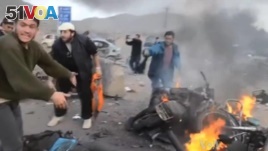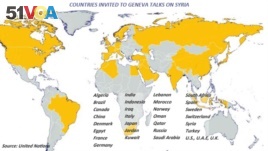January 21,2014
WASHINGTON — Syrian peace talks are scheduled to start Wednesday in Switzerland, nearly three years after the start of the uprising against President Bashar al-Assad. The government in Damascus is rejecting calls that it share power, saying these talks should be about fighting terrorism.
President Assad says continuing violence within the opposition, including extremist fighters linked to al-Qaida, shows why talks should focus on fighting terrorism.
He told Syrian state television that negotiations also should restrain countries that he says support terrorists.

''The Geneva conference must lead to clear results regarding the fight against terrorism in Syria. More specifically, putting pressure on the countries supporting terrorism in Syria by sending fighters, sending money to terrorists organizations, sending weapons," said Assad.
But the Western governments backing Assad's opponents say these talks are meant to end the fighting by creating a transitional government to replace him.

Countries invited to Geneva talks on Syria
"It is the center of gravity for all of the dynamics in the Middle East. Bashar al-Assad, the current president, and his father have made the most of that. And if they are welcome to the table in Geneva, they will come and they will turn it and use it to again make Syria central, central in whatever the major dynamic push is. And right now for Americans that's terrorism," she said.
Especially as more American jihadists are reportedly taking part in the fight.
"And now here the FBI and the CIA are very concerned about those Americans returning to the United States battle-hardened and trained by terrorists. That's something the Assad government will make a lot of," she said.
But the battle within the opposition, involving groups such as the Islamic State of Iraq and Syria [ISIS] may unite more moderate rebels, said U.S. Institute of Peace analyst Steve Heydemann.
"There was enormous disdain and unhappiness about how the ISIS battalions were operating in Syria. They were seen as a growing threat to the objectives of the revolution. They were seen as a threat to the coherence and the security of the armed opposition itself. And so the armed opposition is now united against them," he said.
This may also help a divided political opposition that Leverett said is undercut by Assad's populist appeal to defending Syria against foreign terrorists.
"You have an opposition there that is not able to cohere because of differences among it. And it's really radical. It has been from the beginning. Assad is very adept at going through that, presenting himself as not just a strong leader, but as the secular front, as a leader who can come through crises," said Leverett.
These first talks are set to open with a meeting of foreign ministers before Syrian government and opposition delegates join United Nations and Arab League mediator Lakhdar Brahimi.